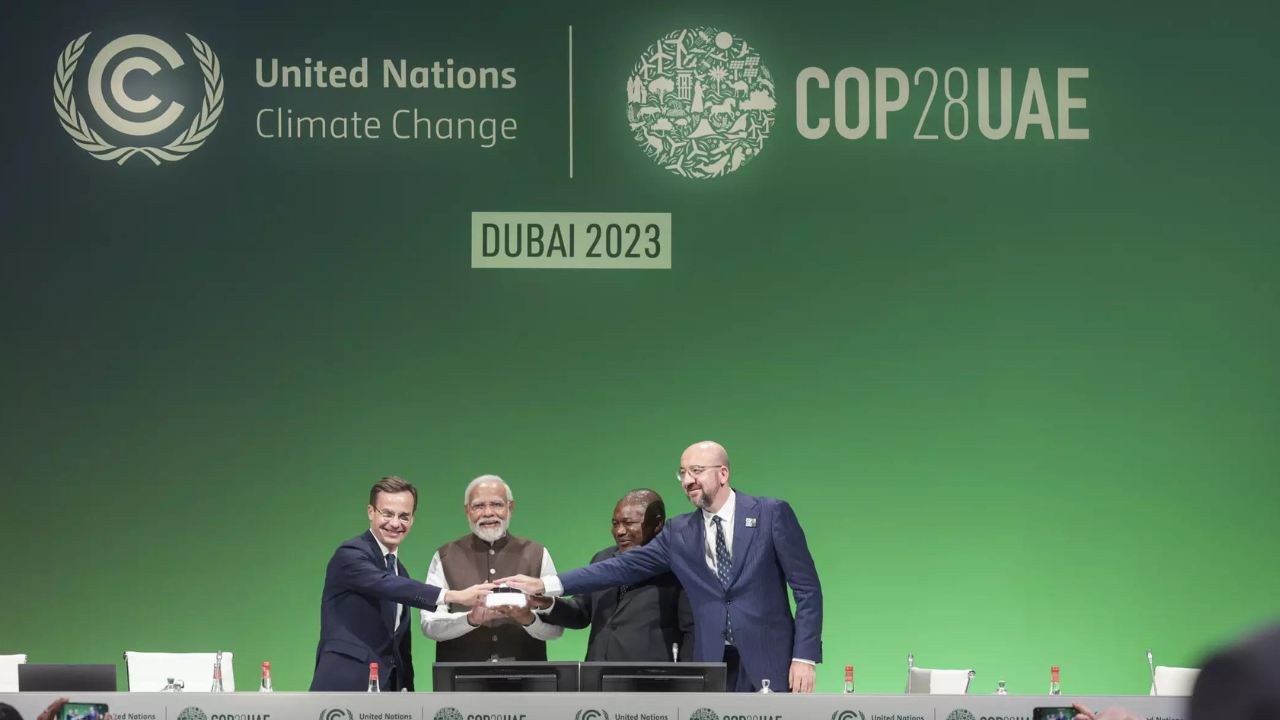The PM’s appeal came during his address to global leaders at the inauguration of the high-level segment of heads of state/government at CO.
In October, India had launched the country’s Green Credit Programme(GCP) to encourage environmentally friendly practices. It is an innovative market-based mechanism designed to incentivise voluntary environmental actions.In the initial phase, the programme focuses on two key activities – water conservation and afforestation – which will generate credits and can be traded on the green credit platform.
The PM’s offer to host the 33rd session of the climate conference appears to be part of several initiatives his government has taken to try to change the perception of India being part of the problem of global warming to being a prominent part of the effort for a solution to deal with the climate crisis.
Modi said countries have to be “decisive” and “work in unity” while giving due carbon space in the Global Carbon Budget to all developing countries to grow economically. Emphasising “innovation”, he cited the example of how his suggestion of Mission LiFE (lifestyle for environment) at COP26 had become an important tool to reduce emissions through environmentally conscious lifestyles.
Calling the GCP yet another initiative in this direction, he urged world leaders to join it and reminded the participants how G20 under India’s presidency focused on a similar pro-planet approach of sustainable future through green development pact that includes agreeing to work for tripling global renewable energy capacity by 2030 and making efforts to increase climate finance from billions of dollars to trillions.
The GCP is independent of the Carbon Credit Trading Scheme where credits are assigned to projects/activities that can reduce greenhouse gases. Carbon credits are measured in tonnes of carbon dioxide-equivalent and then priced and traded. People and businesses that wish to offset their emissions can buy these credits and ‘neutralise’ their carbon footprint. Green credits, on the other hand, can be generated by taking water conservation measures or through plantation. Since an environmental activity generating green credit may have climate co-benefits, such as reduction of carbon emissions, the GCP may also get carbon credit from the same activity under the scheme.
The PM also flagged how India was among the very few countries who were on track to meet their 2030 nationally determined contribution (NDC) – voluntarily pledged climate actions under the Paris Agreement. “India has presented an example of a balance between ecology and economy before the world. India’s contribution to the global carbon emission is merely 4% despite the country having 17% of the world’s population,” Modi said.
In October, India had launched the country’s Green Credit Programme(GCP) to encourage environmentally friendly practices. It is an innovative market-based mechanism designed to incentivise voluntary environmental actions.In the initial phase, the programme focuses on two key activities – water conservation and afforestation – which will generate credits and can be traded on the green credit platform.
The PM’s offer to host the 33rd session of the climate conference appears to be part of several initiatives his government has taken to try to change the perception of India being part of the problem of global warming to being a prominent part of the effort for a solution to deal with the climate crisis.
Modi said countries have to be “decisive” and “work in unity” while giving due carbon space in the Global Carbon Budget to all developing countries to grow economically. Emphasising “innovation”, he cited the example of how his suggestion of Mission LiFE (lifestyle for environment) at COP26 had become an important tool to reduce emissions through environmentally conscious lifestyles.
Calling the GCP yet another initiative in this direction, he urged world leaders to join it and reminded the participants how G20 under India’s presidency focused on a similar pro-planet approach of sustainable future through green development pact that includes agreeing to work for tripling global renewable energy capacity by 2030 and making efforts to increase climate finance from billions of dollars to trillions.
The GCP is independent of the Carbon Credit Trading Scheme where credits are assigned to projects/activities that can reduce greenhouse gases. Carbon credits are measured in tonnes of carbon dioxide-equivalent and then priced and traded. People and businesses that wish to offset their emissions can buy these credits and ‘neutralise’ their carbon footprint. Green credits, on the other hand, can be generated by taking water conservation measures or through plantation. Since an environmental activity generating green credit may have climate co-benefits, such as reduction of carbon emissions, the GCP may also get carbon credit from the same activity under the scheme.
The PM also flagged how India was among the very few countries who were on track to meet their 2030 nationally determined contribution (NDC) – voluntarily pledged climate actions under the Paris Agreement. “India has presented an example of a balance between ecology and economy before the world. India’s contribution to the global carbon emission is merely 4% despite the country having 17% of the world’s population,” Modi said.






